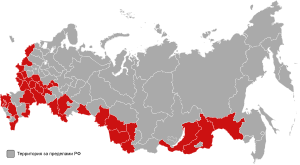Russian presidential election, 1996
|
|
||||||||||||||||||||
|---|---|---|---|---|---|---|---|---|---|---|---|---|---|---|---|---|---|---|---|---|
|
||||||||||||||||||||
| Turnout | 69.7% 68.8% |
|||||||||||||||||||
|
||||||||||||||||||||

Regions in which the second round of elections won by Boris Yeltsin
Regions in which the second round of elections won by Gennady Zyuganov
|
||||||||||||||||||||
|
||||||||||||||||||||
Presidential elections were held in Russia on 16 June 1996, with a second round on 3 July. The result was a victory for the incumbent President Boris Yeltsin, who ran as an independent. Yeltsin defeated Communist challenger Gennady Zyuganov in the run-off, receiving 54.4% of the vote. His inauguration ceremony took place on 9 August. There have been claims that the election was fraudulent, favoring Yeltsin.
Following December 1995, the Communist Party of the Russian Federation had achieved dominance in the State Duma. On 9 January 1996, Chechen rebels seized thousands of hostages in Dagestan, and Yeltsin's response was viewed as a failure. The Russian economy was still contracting and many workers had been unpaid for months.
President Yeltsin's public opinion was at a historical low point, a fifth place among presidential candidates, with only 8 percent support, while Communist Party leader Gennady Zyuganov was in the lead with 21 percent. When Zyuganov showed up at the World Economic Forum in Davos, Switzerland, in February 1996, Western leaders lined up to meet him. Major world media treated him as the likely next president of Russia.
This tendency made the oligarchs fearful of Yeltsin's departure and replacement by the Communist Party leader, thus threatening their recently acquired wealth. As a result, in Davos, Boris Berezovsky reconciled himself with Vladimir Gusinsky to make a united front against Zyuganov in the upcoming June election. Before leaving Davos, they had dinner with Mikhail Khodorkovsky of Menatep Bank and Yukos Oil, and Vladimir Vinogradov of Inkombank, and the four forged the "Davos Pact". Returning to Moscow, they added in Vladimir Potanin, Alexander Smolensky, Mikhail Fridman and Pyotr Aven. They held a series of meetings and decided to let Anatoly Chubais in charge of a new campaign organization for Yeltsin's reelection.
...
Wikipedia


